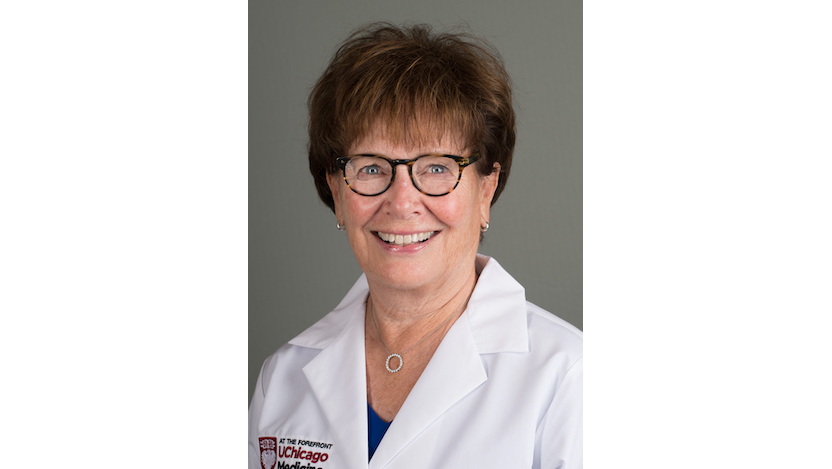There are few people in the world who know more about the care of patients with ostomies than advanced practice provider Janice Colwell, APN, CWOCN, director of the University of Chicago Medicine Digestive Diseases Center’s Ostomy Care Clinic. In practice for forty years, Colwell presents internationally on best practices and advances in stoma and ostomy care. She and her team support a wide range of patients, from recovering from major surgery, to learning to live their best lives with their ostomies, day by day.
An ostomy is the surgical creation of an opening or stoma from one part of the digestive tract to the outside of the body, where waste is collected in a pouching system (sometimes colloquially called an ‘ostomy bag’). For patients with severe Crohn’s disease or ulcerative colitis, where the colon is too damaged to perform its job, this life-saving surgery can enhance quality of life and dramatically improve symptoms. Colectomy surgery (removal of all or part of the colon) followed by creation of an ostomy, is also a lifesaving surgical option for colon cancer patients.
Colwell’s long career in ostomy care began with her work on the floor as a staff nurse. After working with many patients with ostomies, she quickly realized that no one had the skills to help patients adapt to living with ostomies post-surgery. She explains, “We would help the person survive a disease that was really very difficult. They would end up with a stoma, and then they were on their own.”
Colwell says, “I have always enjoyed the relationship-building that occurs with nursing. When I realized that the ostomy patients were struggling, I tried to put together that relationship-building, patient-education piece, and get them the skills they needed.”
After completing a training program at Washington University in St. Louis, Colwell came to the University of Chicago Medicine, earned her Masters’ and Advanced Practice Nursing degrees, and built the University of Chicago Medicine Digestive Diseases Ostomy Care Clinic.
“I realized I needed more advanced education. I needed to really be able to better assess and plan for patient care, and communicate with colleagues…That’s what prompted me to get my master’s degree and then my license to be an advanced practice nurse,” explains Colwell.
Colwell went on to serve as the President of the Wound, Ostomy, and Continence Nurses’ Society (WOCN Society), which supports and educates nurses to be primary caregivers for patients with ostomies. Such nurses provide a critical component of patient care, as surgical and medical training for physicians does not cover such specialized ostomy-care skills. About 60% of nurses who belong to the WOCN Society hold Bachelors of nursing degrees; 40% are advanced practice nurses.
Colwell encourages any patients who will undergo surgery to create a stoma to meet with an ostomy nurse and ensure that they get good follow-up care to help them avoid complications and correctly use their pouching systems.
“When you look at the quality of life studies, many of the patients struggle because without access to good care, they don’t have the right pouching system; they’re not educated on how to use it and so they can’t really get back into their daily routines,” explains Colwell, “With the right care, our patients can get back to doing everything they love, and feeling much better.”
Patients seeking ostomy care can learn more about the services offered at the University of Chicago Medicine on the University’s website, which includes information to make an appointment with Colwell or her team.

